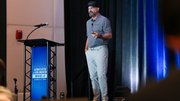Article
AI improves product selection, boosts revenue, efficiency for vending machines
A panel of vending operators described how AI allowed them to improve sales on an individual machine basis and boost operational efficiency.

May 8, 2019 by Elliot Maras — Editor, Kiosk Marketplace & Vending Times
Artificial intelligence, which experts claim will revolutionize many industries by allowing organizations to use extensive amounts of data, has already proven itself in merchandise vending. During the recent National Automatic Merchandising Association show in Las Vegas, a panel of vending operators described how AI allowed them to improve sales and boost operational efficiency.
The vending operators, all of whom operate thousands of machines over hundreds of miles, said AI has allowed them to identify the best selling products on an individual machine basis. They are among a number of vending operators that have taken advantage of the Vending Analytics tool from Hivery, an Australia based AI provider.
The panel was moderated by Hivery co-founder and data scientist, Matthew Robards, and Sharyn Kolstadt, U.S. business development manager.
The right products in the right machine
"We are only as good as the products we have at the point of purchase," said Josh Rosenberg, president and CEO of Accent Food Services, a nationwide beverage and foodservice provider based in Pflugerville, Texas.
Rosenberg said he recognized the benefits of AI from using Facebook for his personal shopping.
In an 18-month test, Rosenberg found the AI solution, in combination with his vending management software, boosted revenues between 20% and 50%, depending on the machine. The Hivery solution uses the vending company's own sales data as well as external data to determine the most profitable product assortment and prices for beverage machines on an individual basis.
Identifying the best selling products on an individual machine basis makes sense, said Rosenberg, since location populations are not demographically uniform and the number of products to consider has exploded in recent years. Prior to using the AI tool, his company was using a standard machine planogram that limited the variety of products being offered.
Since deploying the AI tool, Accent Food Service expanded it to its snack machines. Rosenberg said his next step will be to use the AI tool to pair beverages and snacks.
It's all about the data
"It's all about how we harness data," said panelist Scott Corley, vice president of on premise at Coca-Cola North America Group.
He said AI allows the company to remove cost from the "back end" and drive 20% revenue growth.
"AI allows us to make rapid changes," said panelist Rich Stenseth, director of retail vending for Swire Coca Cola USA in Draper, Utah, which operates machines in 13 western states.
By changing selections faster, he said, sales can increase faster.
The employees at Swire Coca Cola USA were surprised when the AI tool recommended lemonade at a university location, Stenseth said. What the staff didn't realize was that university students were using the lemonade for mixers as opposed to refreshments. The AI tool was able to make this recommendation.
Following this experience, the company added lemonade to machines at other college sports locations.
The AI tool also allowed the company to automate purchases from its suppliers, freeing the salespeople from having to order inventory, Stenseth said.
Employee buy-in needed
When introducing a new technology, the panelists agreed on the importance of convincing employees to support the initiative.
One way to gain employee support is to take into account what motivates employees when giving them instructions, Rosenberg said. He said employees will support processes that make their jobs easier, let them go home earlier and improve their earnings.
"Once you've got them on board, then you can really go," Rosenberg said.
Coca Cola North America Group made a video for employees to explain why they were being asked to do certain things, Corley said.
"We started with ‘why?'" he said.
The employees eventually realized the purpose of introducing AI was to help them make more money, and they became supportive.
Stenseth said it's important to keep everyone affected in the loop. A senior vice president at his company was not aware of product assortment changes in some of the machines, causing him to question an assortment he saw in the field. To keep everyone in the loop, they attached a sticker to the machines as they were updated.
To execute AI, it is necessary for the company to "scrub" its data. Rosenberg said data integrity is the biggest challenge his company faced in deploying AI. For example, he said the company was using 24 names for a Snickers bar.
Rosenberg also said it is necessary to have a "champion" responsible for ensuring the project progresses according to plan.
When deploying AI, the panelists agreed it is important to trust the data.
"It allows us to do these changes quietly and efficiently, but you also have to trust the data," Stenseth said. "It does challenge what you always thought, but trust it."
"You have to trust it," Rosenberg agreed. "We've done so and we've seen tremendous results."
During last year's NAMA show, another Hivery customer, Reyes Coca Cola Bottling based in Irvine, California, presented similar results for a two-year AI project.
About Elliot Maras
Elliot Maras is the editor of Kiosk Marketplace and Vending Times. He brings three decades covering unattended retail and commercial foodservice.
 ChatGPT
ChatGPT Grok
Grok Perplexity
Perplexity Claude
Claude










